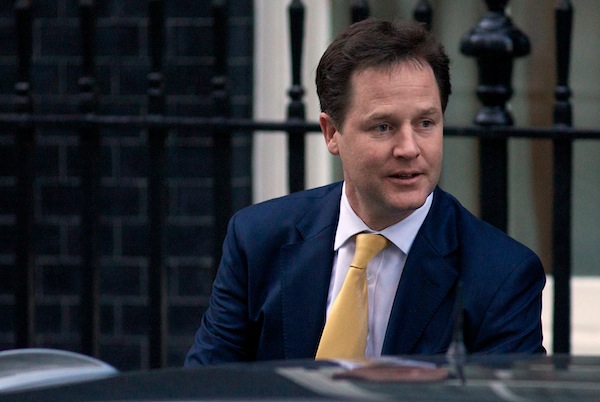Cabinet Secretary Sir Jeremy Heywood has signed off on an agreed breach of collective responsibility in the boundaries vote, but what does that mean for the way the government works from now on?
The Prime Minister’s official spokesman argued this afternoon that this did not in any way set a precedent for the way the two coalition parties vote on other policies. He added:
‘The Cabinet Secretary was consulted. It has been formally agreed but only in this specific instance. Having consulted the Cabinet Secretary, they recorded their agreement to set aside collective responsibility on this occasion. The rules with regard to this allow for the setting aside on very specific issues of collective responsibility where, as in this case, the two party leaders have agreed that.’
Even if you buy the idea that this is is all fine and above board and that Lords reform and the boundaries are linked in the Coalition Agreement (on which matter, more here), it is very difficult to accept that this is the last time ministers will be tempted to use this in the Coalition. There might be many policies where the two parties are able to reconcile their differences before bills reach the Commons, but on one issue, the Prime Minister and Deputy Prime Minister have already broken with another piece of government protocol by giving separate Commons statements on the Leveson report.
Then, the Lib Dems were keen to give their own viewpoint because Nick Clegg disagreed with David Cameron’s rejection of statutory underpinning. The talks are still ongoing, but a crunch point is already approaching. At the end of the month, Labour is planning to force a vote on its own draft Leveson legislation. Now the party obviously does not have any power to bring legislation into play, but a carefully-worded motion calling for statutory underpinning could well create some dividing lines which could include the Lib Dems.
Downing Street says all this is rather too hypothetical at the moment to start considering whether collective responsibility could be suspended for a second time to allow Lib Dem ministers to express their own party line on press regulation. Besides, the talks are progressing pretty well at the moment: Tories are impressed with the way Ed Miliband and colleagues are trying to avoid making this a party political football, and if consensus is possible on the idea of a Royal Charter, then an insurrection in the Commons may not be necessary.
But if divisions over the fundamental question of whether to use statute or not open up, the ground has already been prepared for separate party stances on Leveson within the Coalition. In that instance, Sir Jeremy Heywood would have to decide whether collective responsibility should be waived again.
Is Leveson a fundamental threat to a free press? On Wednesday 30 January, the Spectator hosts a debate between advocates of statutory regulation Chris Bryant and Max Mosley and those against statute, Richard Littlejohn, Paul Staines and John Whittingdale. You can book tickets here.







Comments